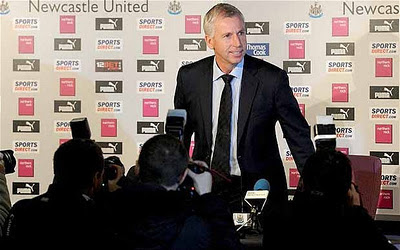Noted philosopher Marge Simpson once said "we can't afford to shop at a store which has a philosophy". Philosophy is nice, but, like everything, subject to the dreaded Cost/Benefit analysis.
In fact, "footballing philosophy" is used only rarely to describe the methods of managers like Tony Pulis or Sam Allardyce and is reserved for so-called purists like Owen Coyle or Arsene Wenger. Almost by definition, pragmatists - including even Jose Mourinho - are lauded only for results.
Certain fans expect their squad to play a certain way - not necessarily as a result of tactical choice, but because "we've always done it". Because success was once achieved playing a certain way, success must always be attained thus. Such an attitude results not in top-four expectations of success (seen by outsiders as "We deserve it because we're United/Liverpool/Arsenal"), but of fans' yearning for glory days - and players - past (the "He's not as good as Warren Barton" attitude).
The Barton reference is deliberate, not just because he's one of the faces of Fox Soccer, but also because his greatest success was as part of Keegan's Newcastle during the mid-nineties. It was this team, with Alan Shearer as it's centre(forward)piece, that totally and indelibly inspired the flawed logic of the "Cult of no. 9", a spearhead supplied by tricksy wide men.
West Ham, the club of Bobby Moore, loved the idea of West Ham football: thrusting wing play and the ball spraying about like Darren Fletcher on a good day. Though times tough and good, the Hammers could be counted on for moments of magic, even when they featured John Hartson.
At both clubs, a transformation has taken place.
Subject to managerial and personnel changes, both these clubs have reinvented themselves. The Hammers did so through choice after being dumped into the second division. After dispensing with the popular but perhaps overmatched Gianfranco Zola, they employed Avram Grant, a man with as much personality as yoghurt. Grant, the only man to not register a score on a Myers-Briggs test, couldn't inspire the Hammers to play good football and when the second division beckoned, pragmatism reigned.
Their club has evolved, albeit by the choice of Messrs Gold & Sullivan, through a perceived necessity. In true Darwinian fashion, the Hammers of 2010-11 needed to evolve in order to survive - perhaps even as an entity, given a perilous financial state. The catalyst was the appointment of Allardyce, known as the ultimate long-ball merchant.
Evolution can be violent, inflammatory change; a force of nature that we only mostly understand. West Ham's evolution promises to be just that. The response of an organism to its environment occurring in the far reaches of the Northeast takes a different form: that of slowly adapting current equipment in order to thrive.
At Newcastle, it wasn't relegation or a change of manager which inspired their move away from a tried footballing philosophy, but the sale of Shearer's successor and Geordie icon-in-waiting, Andy Carroll. When Kenny Dalglish offered 35 million pounds for the next Tyneside messiah, Mike Ashley and Alan Pardew's poker skills bluffed the Reds up to a very suitable price and then cashed in.
They did so knowing that while Carroll could be the best English centre-forward of the next decade, offers of that calibre don't come along often for unproven commodities. This left them with a line led by the likes of Demba Ba (who's knees have failed more medical tests than Crippen), Leon Best and Shola Ameobi - and pre-empted midfielders Cheick Tiote, Yohan Cabaye and - hopefully - Hatem Ben-Arfa into supplying the goals.
This lineup is given so much impetus from the centre of the park - rather than, as Toon history dictates, out wide - and has worked well so far. Though they're not expected to stay there, the Magpies sit in fifth position - after adapting their game style to suit their players, rather than the reverse.
Evolution occurs in order for a species to survive and thrive in a new, changing environment. It can be spontaneous, is always reactive (rather than proactive) and always benefits the evolutionary organism in the short term - just think of the dodo. Questions then, are asked in the long term with the benefit of hindsight.
So it's a lot like football.


No comments:
Post a Comment